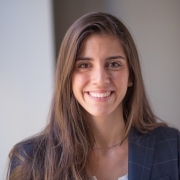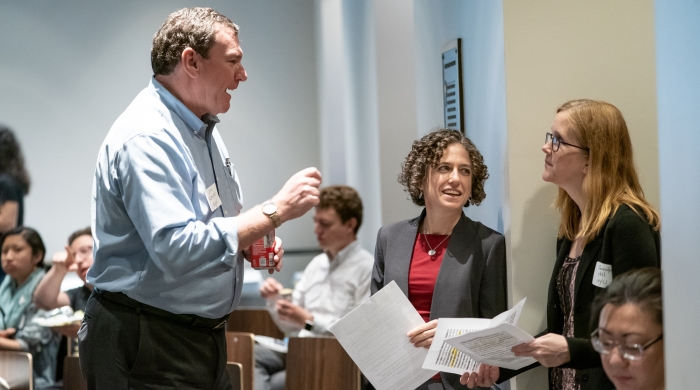
IHDSC Seed Awards enable faculty to engage in research projects with a demonstrated commitment to interdisciplinary perspectives that seek to dismantle inequality, expand opportunities, and increase social impact. This year, we partnered with NYU’s Cross-Cutting Initiative on Inequality to fund proposals that center the voices and knowledge of community stakeholders, feature research teams that include early-career investigators, BIPOC investigators, and/or investigators new to IHDSC or NYU, and integrate collaboration and partnership. Our 2022-2023 awardees, their research teams, and project summaries are listed below.
The Effects of Educational Investment with Debt Forgiveness on Inequality Reduction: Causal Effects of Robert Smith’s Gift to the Morehouse College Class of 2019
Student loans are an integral part of financing a college education. This is especially true for African American males who view formal education as an opportunity to penetrate primary labor markets and access higher wages. Morehouse College, an elite Liberal Arts Institution for Black men, primarily serves students of middle-class background; however, according to the College Score Card, roughly 70 percent of its students qualify for federal aid and, likely, could not afford tuition without student loans. With median college loan debt between $21,000 and $28,000 upon graduation, average monthly college loan debt payments can reduce wealth and consumption prospects by up to $280 per month. For one class, this burden was erased. At the Morehouse College 2019 commencement ceremony, Robert Smith, Chairman and CEO of Vista Equity Partners, generously committed to paying the college loan debt of the entire graduating class, which equates to absolving $34 million in debt across hundreds of graduates. We hypothesize that this life-changing gift weakened budget constraints in ways that significantly altered the wealth accumulation, professional trajectories, and the life-course transitions (such as partnering and parenting) of the 2019 graduates. Using both administrative and survey data, this research identifies the causal effects of Smith’s gift on the class of 2019 relative to a control group comprised of neighboring cohorts of Morehouse graduates. This work offers important evidence on the potential joint roles of educational investment coupled with targeted wealth transfers as a vehicle for addressing multiple dimensions of socioeconomic inequality.
PI: Dr. Ravaris Moore, Assistant Professor of Sociology, Arts & Science
Co-PI: Dr. Juliet Elu, Morehouse College, and Dr. Miesha Williams, Spelman College
Criminal Activity Nuisance Ordinances: A National Assessment
Criminal Activity Nuisance Ordinances have been the subject of interest for sociologists, economists, political scientists, and legal professionals. These ordinances, also known as CANOs, are local policies passed by local governments that allow officials to designate specific properties and residents as nuisances after repeated interactions with the police. After the designation, the property owners are penalized via fines or the seizure of property if they do not abate the nuisance by removing the tenants. Research from sociology and economics finds that these policies disproportionately fall on people of color and victims of crime. Legal researchers and political scientists find that these policies have discriminatory intent or emerge based on race-based considerations. Yet, we know little of the scope and scale of these ordinances. All papers on this topic have focused on either single states or single cities. This problem exists because we lack a nationwide dataset that tracks these policies. Indeed, lawyers seeking to challenge CANOs in court do not have a single database to find and prioritize their efforts. To fill this gap, I propose a primarily descriptive paper to answer two questions: (1) where do these policies exist, and (2) how do they vary? To answer these questions, I plan to construct the first comprehensive dataset that identifies, characterizes, and tracks the development of these discriminatory policies. We see this study and the resulting data as providing the necessary infrastructure to continue the interdisciplinary work of understanding local discriminatory policies.
PI: Dr. Bryant Moy, Data Science Faculty Fellow, Center for Data Science and Visiting Assistant Professor of Politics, Arts & Science
Ballroom Pedagogues Pilot Project
The goal of this 14-week pilot project is to a) study the pedagogical and curricular approaches of one Black trans-feminine ballroom educator as she creates and facilitates an 8-week course on ballroom fashion and runway modeling for Black LGBTQ+ youth in NYC, and b) deepen our understanding of how participating in this course impacts the overall well-being and sense of agency of the Black LGBTQ+ youth enrolled. Designed as an ethnographic case study this project will consist of interview, focus group, observation, and personal journal data. This work extends current ethnographic work on reducing inequality in the schooling realities of Black LGBTQ+ youth by exploring how they care for and educate themselves in community. This pilot is the next step in a larger project exploring the pedagogy of ballroom educators to arrive at a better understanding of how to engage in culturally sustaining and LGBTQ+ inclusive pedagogy that responds to the lived experiences of Black LGBTQ+ youth, ultimately constructing a portfolio of effective practice to be used in teacher preparation, professional development, and educational policy making. As an interdisciplinary endeavor, for this research we rely on multiple bodies of knowledge from various fields such as curriculum and teaching, women and gender studies, performance studies, and sociology to work toward new theories and interventions for social justice in the lives of Black LGBTQ+ youth. In addition, with this project we are inverting the questions commonly asked about Black LGBTQ+ victimhood to actively center the knowledge of a Black trans woman.
PI: Dr. Shamari Reid, Assistant Professor of Teaching and Learning, Steinhardt
Partner: Hetrick-Martin Institute and House Lives Matter
Using Beatboxing to Access the Benefits of Music Making in a Group of Adolescents
The objective of the proposed study is to assess whether beatboxing has similar effects as music on mental health and cognition in a group of adolescents from underserved high schools in the New York City area. Beatboxing is the art of making percussive sounds and music using your voice, mouth, and body. Beatboxing requires no knowledge of music theory and no musical training and can be done immediately regardless of ability or disability. In this regard, beatboxing is much more democratic than classic music making interventions, which require (i) some musical knowledge or training and close to perfect motor and cognitive abilities from the participants, and (ii) the purchase of expensive equipment. We hypothesize that beatboxing will improve mental health (e.g., reduced depression, stress and anxiety, increased self-esteem) and cognition (specifically in the realm of attention) of a group of high school students. The results of the beatboxing intervention will be compared to two control groups, one composed of students enrolled in a classical music making program involving hand drumming and another consisting of participants not enrolled in any intervention.
PI: Dr. Pablo Ripollés, Assistant Professor of Music Technology, Steinhardt; Assistant Professor of Psychology, Arts & Science; and Associate Director of the Music and Audio Research Laboratory (MARL)
Partners: Bridging Education & Art Together (BEAT) Global and NYC Public Schools
Results and Updates from Previous Seed Awardees
We checked in with former Seed Award recipients for an update on the status of their Seed research projects, key findings, and plans for the future.

Despite increased use of online grocery shopping among individuals with low-income, key barriers to healthy online purchases still exist, including delivery fees, mistrust of grocery selection, loss aversion, and impulse purchasing. Thus, with the support from the IHDSC Seed Award, Dr. Angela Trude (FY22 Seed Award Recipient) pilot tested 4 strategies uniquely designed to support healthy online food shopping in her study, Improving Access to Online Purchasing of Fruits and Vegetables for Families of Low-Income. Families (n=59) living in the Bronx received 12-week free online grocery delivery and over 8 weeks were randomized to: 1) free delivery only; 2) weekly text messages targeting mistrust; 3) weekly $10 matching credit for fruit and vegetable (FV) purchases online; or 4) weekly texts of personalized menu plans with grocery list recommendations. Feasibility was moderate: 60% ordered groceries online, 41% received and watched the online grocery shopping tutorial. 90% of participants reported that the tutorial was helpful. All participants reported receiving program text messages weekly, 82% deemed them helpful. The moderate-high feasibility and acceptability of the pilot strategies are promising for the development of a fully powered optimization trial which will be informed by the Multiphase Optimization Strategy (MOST).

We are extremely grateful for the support provided by the IHDSC Seed Award. It not only allowed us to form and build relationships with community organizations in the Bronx and collect pilot data, but also to form an amazing team of NYU research assistants at the graduate and undergraduate levels! Students are the core of the project and gained first-hand experience in community-based research design, implementation, and evaluation.
Two Masters students from the research team will disseminate findings from this work at the American Society for Nutrition 2023 meeting in Boston in July. Dr. Trude wrote, "We also thank the IHDSC team for their continued support as we prepare extramural grant proposals on this and other emergent topics from this program of research."

Dr. Susannah Levi’s (FY19 Seed Award Recipient) project, High variability phonetic training as a mechanism for improving underlying reading skills in school-age children, was focused on how listeners perceive speech sounds that are intermediate between two other sounds. Because of COVID-19, the project shifted to ask whether the types of response options on a screen would change how people listen to speech sounds. The goal was to confirm that using different response options were equivalent, which would allow us to test speech processing in both children and adults. This study examined having letters on the screen (for the sounds "p" and "b") or having images on the screen (a pear and a bear). Results confirmed no difference in how adults respond to these response options. Therefore, researchers can use images with children and compare these findings to research conducted with adults that relied on letters to understand how speech is perceived.

It Takes a Village: Understanding the Interactive Roles of Families, Schools, and Communities in the Student Discipline Process, by Drs. Luis Rodriguez and Richard Welsh (FY20 Seed Award Recipients), explored the influence of school-family ties and neighborhood context on student experiences with exclusionary discipline in schools. The research revealed that stronger trust between school staff and parents plays a crucial role in determining the extent of disciplinary actions faced by middle school students, while middle and high school students residing in neighborhoods with higher levels of social disorganization were more likely to face exclusionary discipline, regardless of their observable characteristics such race, gender, and eligibility for special education services. The Seed Award funding provided the resources to complete an initial phase. The next phase will include a broader investigation into exclusionary discipline, which now includes examining the role of school support staff, inclusive discipline practices, and the influence of gentrification on disciplinary trends in schools. For more on this topic, read the research team’s article, Beating the school discipline odds: conceptualizing and examining inclusive disciplinary schools in New York City.
Learn More
IHDSC Seed Award Program
IHDSC is committed to funding new projects that bridge multiple domains of expertise and further the mission of the Institute.
IHDSC Initiatives
IHDSC hosts a range of initiatives aimed at catalyzing new programs of multidisciplinary research, linking people across divides to solve social problems, building intellectual community, and disseminating research evidence to policymakers, practitioners, and general audiences



